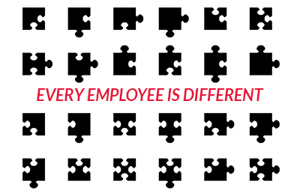Is your turnover toxic? Your team acting like terrors? Instead of blaming them, maybe it’s time to consider the reasons your recruiters keep running away. A positive work environment brings out the best in everyone, so is it their behaviour that’s the issue...or yours? Here are four reasons that could explain why your staff keep leaving you:
 1. Your recruitment process sucks
1. Your recruitment process sucks
Recruiter 1 rocks up and dazzles you with a spreadsheet full of big numbers.They reel off your sector’s biggest clients and boast that they’ll move with them. You’re visualising piles of cash and hire them. But… what if Recruiter 1 has been trampling over their colleagues and causing havoc? Recruiter 2 may be suffering in that environment and as a result, looks average on paper. It’s really easy to base a hire purely on figures, but increasing Recruiter 2’s happiness should naturally increase their billing. If we hire based on coachability, emotional intelligence, motivation and positivity, we might find that a different candidate is the standout, and as we build our team in this way we’re blessed with consistent, happy and motivated staff who are eager to achieve more.
2. They hate what they’re doing
In a survey I read 24% of respondents said “more opportunities to do what I do best” was the key to their job satisfaction. (Gallup Employee Engagement Survey) No, this doesn’t mean that you could make your employees 24% happier by giving them more work! The point is, it has to be the right kind of work. The best managers understand what people like about their jobs. There are always going to be elements of a job that someone doesn’t like but have to suck it up and do anyway, but if the majority of their time is spent on tasks they find mundane or frustrating, they’re never going to achieve what they’re capable of. If we find a way to let them focus on work that uses their skills and experience, their role will become challenging for the right reasons.
 3. You’ve got a “one size fits all” management style
3. You’ve got a “one size fits all” management style
I hate being micro-managed. It makes me feel stifled, mistrusted and babied. However, other people like that style of management as they feel as if they have more structure. Have you ever interviewed someone who just exudes energy, and is the biggest biller or the best resourcer? They start out great but over a short space of time that just seems to disappear? In those cases, instead of automatically thinking that person misrepresented themselves at interview, have you considered that it could be something within the work environment that’s zapping their enthusiasm? We expect our new hires to start as they mean to go on, but they have the right to expect the same of us: it’s our responsibility to take that enthusiasm and set if off on the right path. Have you made sure that you’ve put together a decent induction or are you just going to chuck them at a desk and hope for the best? Make an effort to say hello, see how they’re getting on and find out more about what makes them tick. If you’re engaged with your team you’ll quickly spot any changes in behaviour or attitude which otherwise wouldn’t ring alarm bells.
4. You’re not supportive
For many people, career development and training are the most important factors in job satisfaction - poor career prospects are actually the top reason people give for leaving a job. It’s really important to sit down with your team members regularly so you understand what they want to achieve; let them know how what they’re doing at the moment impacts that; and the skills they need to master to get where they want to go. Offer help and coaching, and do what you promise. If they’re hoping to move into a management position, don’t just use them as a means of doing the bits of your job you don’t like – I’ve been there, it’s horrible! Give them the opportunity to increase their knowledge at an operational level, build their goals in to their performance reviews so that you can revisit this frequently, and give them real-time feedback on how they’re getting on. Happy teams are productive teams, so by putting more happiness in, we should see more profit come out! What are your top tips for staff retention? Let us know in the comments!
Vicki Moir
After spending almost a decade in recruitment, Vicki joined Firefish in 2013. As Head of Happiness, she's responsible for all things talent and culture.

 3. You’ve got a “one size fits all” management style
3. You’ve got a “one size fits all” management style


